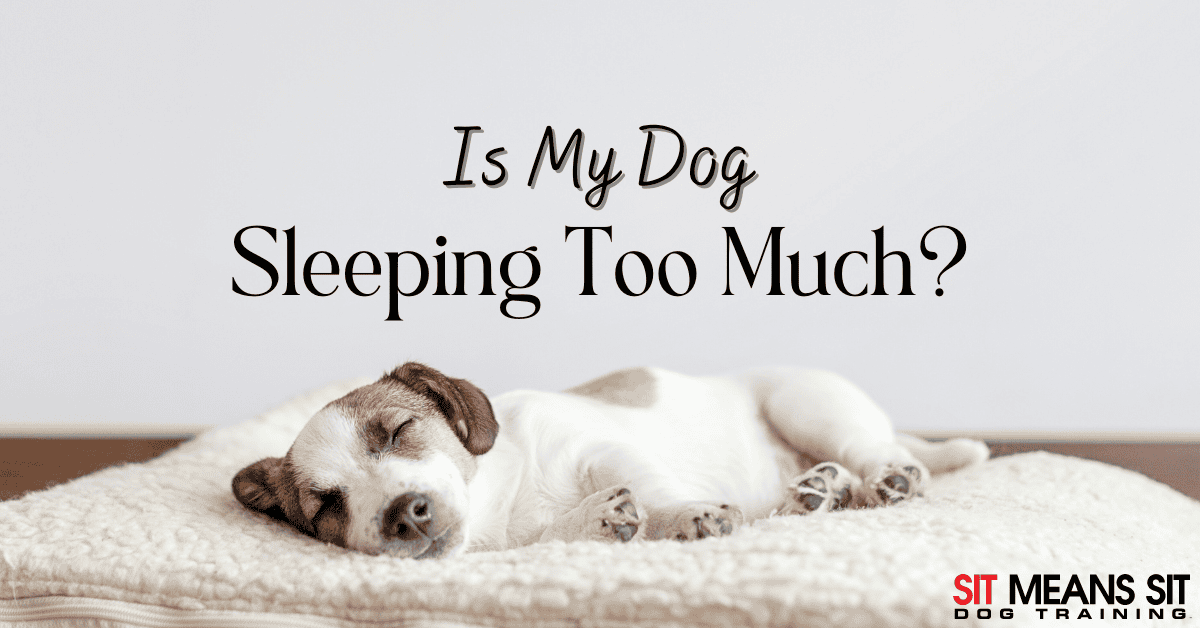It’s no secret that dogs love to sleep. Although frequent naps should be expected, excessive sleeping may indicate underlying health issues. Understanding your dog’s sleep patterns and needs is crucial to ensure their overall well-being. Keep reading to learn how much sleep your dog needs and when you should discuss their sleeping patterns with a vet.
Why Do Dogs Sleep So Much?
If you’ve ever spent the day with a dog, you likely noticed that they spend a large portion of their day resting. In fact, time spent doing activities is typically the smallest part of a canine’s day. So, why is it that dogs sleep so much? According to experts, dogs need more sleep during the day since they spend less time in rapid eye movement (REM) sleep than humans do. REM is an essential sleep stage for restful sleep and is when dreaming occurs. While humans may be in REM sleep for up to an hour during each sleep cycle, this stage only lasts about five minutes for canines. Since dogs get less deep sleep at night than humans, they require plenty of rest during the day.
How Much Sleep Does Your Dog Need?
A variety of factors influence the amount of sleep your pup requires. Typically, large dog breeds need more sleep than small dogs since they exert more energy. Puppies and senior dogs generally need more sleep than middle-aged pups. Adult dogs need anywhere between 11-20 hours of sleep each day. This sleep often occurs within 45-minute increments. Since daytime sleep is incremental, a healthy pup may nap up to 20 times daily.
Factors That Affect Sleep
There are a few factors that may affect established sleep habits, including:
- A new addition to the family: If you’ve recently welcomed a new human or pet into your home, your pup may spend more time sleeping to get some quiet time alone.
- Schedule changes: Dogs thrive on a consistent routine, so a change in their daily schedule due to their owners’ life changes may affect their sleeping patterns.
- Increased playtime: If your pup has been getting more physical activity than usual, an increase in sleep is to be expected. This may occur if your pup has been playing with another dog more or recently started doggie daycare.
- Hot weather: Heat exhaustion can cause lethargy, so keep an eye on a pup who is sleeping excessively after spending a lot of time in the heat.
Ways to Keep Your Pup Active
If you suspect your pup is sleeping mainly out of boredom, they likely need more daily enrichment. Keeping Fido busy with games, toys, and activities will keep them mentally stimulated and active throughout the day. One way to enrich your pup is getting them a puzzle toy and putting their favorite snack inside. You can also create homemade enrichment activities by rolling kibble or treats into a towel or one of your pup’s blankets and letting Fido unravel it.
Additionally, midday walks provide much-needed exercise and mental enrichment. Time spent outdoors allows your pup to stretch out their legs, pick up new scents, and play with new dogs. These activities will keep your pup entertained and likely reduce boredom-related sleeping.
How Much is Too Much?
Although it’s typically normal for our furry friends to spend a significant part of their day asleep, excessive sleeping may indicate a health concern. Below are signs of excessive sleeping because of an underlying issue.
- Noticeable changes in sleep patterns
- Showing signs of anxiety, such as pacing
- Sleep interferes with their eating or drinking
- It’s difficult to rouse your dog from sleep
- Your dog is limping or has trouble walking, running, or jumping
- An increase in sleep is combined with behavior problems or health issues
- Your pup is frequently disoriented, confused, getting lost in familiar places, or staring at walls or corners
- Choosing to sleep even when there are other available activities
If some of these signs have developed gradually and your pup is nearing their senior years, it may be due to aging. An increase in sleep is often expected for senior pups, but a dog who is sleeping significantly more or is reluctant to get out of bed may be suffering from arthritis, diabetes, an endocrine disorder, or another health issue. If your furry friend’s sleep habits seem unusual, discuss their behavior with their veterinarian. Your vet may conduct a physical exam, blood work, or other medical tests to determine the cause.
The best way to know what a standard amount of sleep looks like for your pup is to track their typical day. You can share their sleep patterns with their veterinarian at regular checkups, who can confirm if their habits are normal or potentially concerning. More often than not, a sleeping pup shouldn’t be a cause for concern. Now that you know what abnormalities to look for, you’ll know when to reach out to a professional.

